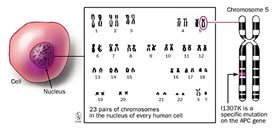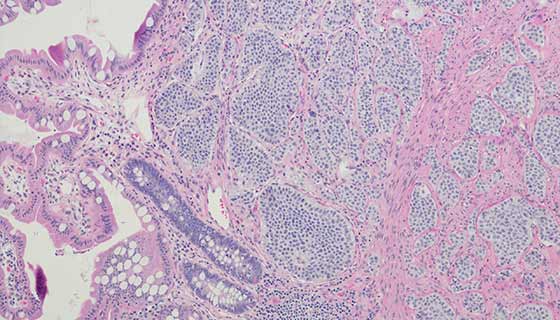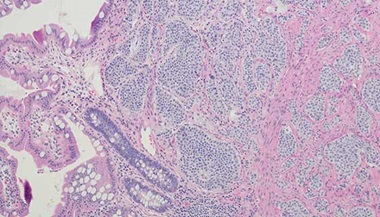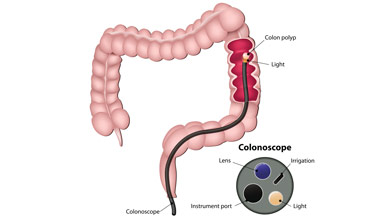APC I1307K and Colorectal Cancer
In 1997, a Johns Hopkins research team found an inherited genetic mutation called APC I1307K. Adenomatous polyposis coli (APC) is a gene that suppresses tumor growth. If the APC gene is defective, it makes the gene unstable and more susceptible to additional changes that may lead to colon and rectal cancers.
The APC I1307K mutation is primarily found in people of Ashkenazi Jewish heritage (Jews of Eastern European or Russian ancestry). Researchers believe that 6 percent of Ashkenazi Jews carry this gene mutation, making them at a significantly higher risk for developing colon and rectal cancers.
APC I1307K Symptoms
Many patients with colon cancer and rectal cancer experience no symptoms in the early stages. In fact, symptoms may not appear until the disease has progressed to an advanced stage. Routine colon and rectal cancer screening is very important. Even children as young 11 years of age should be screened if there is a family history of colon and rectal cancers.
Many symptoms of colon and rectal cancers are also symptoms of other colon diseases. Therefore, it is important to see an experienced gastroenterologist who can perform the necessary tests and make an accurate diagnosis.
Symptoms may include the following:
- Blood in the stool
- Unexplained diarrhea
- A long period of constipation
- Abdominal cramps
- A decrease in the size of the stool
- Feeling of distension of abdomen (gas pain, bloating, fullness and cramping)
- Unexplained weight loss
- Vomiting and lethargy
APC I1307K Diagnosis
If you are of Ashkenazi Jewish descent, your doctor may recommend a genetic test to look for this gene mutation.
Learn more about diagnosing APC I1307K:
Genetic Testing
Genetic testing involves a simple blood test. The test for APC I1307K only scans for that particular gene mutation. It does not look for gene mutations that cause other forms of colon and rectal cancers.
Before having a genetic test, you should undergo genetic counseling. This appointment will help you consider the many issues involved in genetic testing and understand how testing will affect you.
Testing for the APC I1307K Mutation: Are You a Candidate?
You should consider genetic testing if you are of Ashkenazi Jewish heritage and have a family history of colon and rectal cancers or polyps. Family history is defined as having at least one close family member with cancer or polyps. Ashkenazi Jews without a family history of colon or rectal cancers may still wish to be tested.
Positive Test Result for APC I1307K
If your test is positive for the genetic mutation, experts recommend the following:
- If you do not already have colon cancer or polyps: You should have a routine colonoscopy every three years, beginning at age 35, or five to 10 years before the earliest age at which cancer or polyps occurred in your family.
- If you have a personal history of colon cancer or polyps: You should have a routine colonoscopy every two years or as often as your doctor recommends.
- If you are a relative of someone who tested positive for the gene mutation: You should also consider counseling and testing.
It is important to detect polyps or cancer early. Treatment is more successful when cancer is caught at an early stage.
Family History and Physical Examination
Our team will keep a detailed record of your medical history, which includes your personal and family history.
A thorough physical examination will be performed. (In addition, laboratory tests may be ordered.) Your physical exam may include a digital rectal examination. During this painless procedure, your doctor will insert a gloved, lubricated finger into the rectum to gently feel for any abnormalities.
Fecal Occult Blood Test
This test looks for occult (hidden) blood in the stool. For this test:
- You will receive three small cards. Place a stool sample from three consecutive bowel movements on each card.
- A small amount of the stool is placed on a special test strip.
- The stool is analyzed for traces of blood.
Flexible Sigmoidoscopy
A flexible sigmoidoscopy is used to examine the rectum and lower colon. Prior to a flexible sigmoidoscopy, your colon must be clear of stool to enable good visibility. Preparations may include a liquid diet, an enema and laxatives.
During the procedure:
- Your doctor inserts the sigmoidoscope through the rectum and into the anus and large intestine. This area is checked to see if cancer or polyps are present.
- Your doctor may insert biopsy forceps through the scope to remove a small sample of tissue for further analysis. The procedure may cause some cramping or discomfort.
Colonoscopy
A colonoscopy is the best way to detect polyps or cancer, as it reaches further into the bowel than a sigmoidoscopy. Your colon must be clear of stool so your doctor has good visibility. Preparations may include a liquid diet, an enema and laxatives. You are sedated before the procedure.
During a colonoscopy:
- Your doctor inserts the colonoscope through the rectum and into the anus and large intestine to check for cancer and polyps.
- Biopsy forceps may be inserted through the scope to remove a small sample of tissue for further analysis.
- If a polyp is found, it can be removed through the colonoscope.
- You may experience some cramping or discomfort.
Barium Enema
A barium enema (also called a lower GI series) is used to create an X-ray of the rectum and colon. Before the procedure, you will need to clear your colon of any stool. Preparations may include a liquid diet, an enema or laxatives.
During a barium enema:
- A barium preparation (contrast material) is inserted through a rectal tube.
- The barium outlines the colon, highlighting any abnormalities.
- An X-ray is taken.
- If polyps or cancer are present, they can be visualized.
APC I1307K Treatment
Treatment for colon and rectal cancer related to APC I1307K depends on the results of the diagnosis. If your doctor found cancer during the examination, he or she will recommend colorectal surgery. Factors to consider when choosing your specific surgical plan include the following:
- Your cancer stage
- Your age, health and desires
- The potential changes in your bowel function
- Your risk of further cancer formation
Before making any decisions regarding treatment, you should seek genetic counseling as well as a colorectal surgical consultation.






